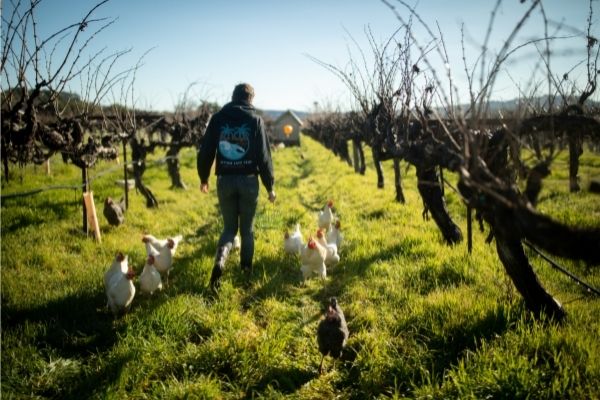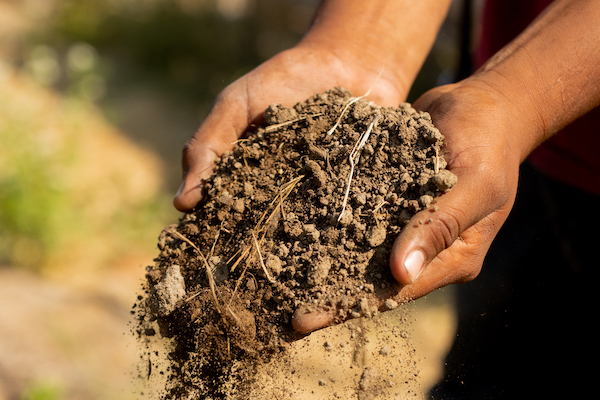Regenerative Wine Farming: What it is and why it matters to our farm and the earth
Regenerative farming is a recent agricultural buzz phrase, but for us at Eco Terreno its a way of life. As winegrowers, we have the privilege of stewarding a special patch of land in Alexander Valley, a tranquil, rural region in northeastern Sonoma County. Bordered by the Russian River, our land abounds with wildlife and flourishes with all types of beautiful and beneficial plant species, many native. We consider it our responsibility to not only make exceptional wines showcasing the unique flavors of our region, but also to lead the way to the future of wine farming, where the benefits are not just what’s in your wineglass but also how we heal, restore, and strengthen our land for future generations. This is the foundation of regenerative wine farming, also known as regenerative viticulture, and it’s what we practice every step of the way at Eco Terreno Wines & Vineyards.

What is Regenerative wine farming?
Regenerative wine farming is essentially what it sounds like—farming grapes in a way that regenerates soil health. But it’s so much more than that. Regenerative farming is a set of organic, ecologically-driven farming practices that enhance our ecosystem into a natural state of health and harmony by working in partnership with nature.
The benefits of regenerative farming, also known as regenerative agriculture, are widespread. Farming this way increases biodiversity, restores soil and plant microbiome, and eliminates the need to introduce toxic pesticides, herbicides, and GMOs into our soils, waters, and grapevines. Equally important are the broader environmental benefits. Regenerative agriculture has the potential to reverse climate change by capturing carbon in the soil and removing it from the atmosphere. Sounds like a good thing to do, right? And perhaps a better way to grow grapes that produce delicious, natural wine?
We agree. For us, regenerative wine farming is the only clear path to ensuring the long-term health of the planet and all its inhabitants. We’ve found it’s also the surest way to make wines that express the truest and most delicious sense of place; we’ll share more on this later. But first, there are a number of elements that go into regenerative farming. We take it many steps further, but let’s start with the basics. Regenerative farming includes:
Planting diverse cover crops
In traditional industrial agriculture, the soil is tilled. This practice allows for the most economical farming, but it’s also terrible for soil health; it fractures the soil’s natural structure and instigates soil erosion, water runoff, and poor water infiltration. At Eco Terreno we follow nature’s lead. We seed more than 100 acres of our estate wine farm with a variety of cover crops that welcome pollinators, increase water retention, and defend against undesirable weeds, erosion, and the need for pesticides and excess irrigation. Simultaneously, these cover crops elevate soil nutrients levels and provide the biodiversity essential to a healthy ecosystem.
Integrating animals and controlled grazing
We welcome sheep, chickens, geese, and ducks to roam between our vines. As they frolic and nibble away at pests and weeds, they add nutrient-rich manure to the soil, improve soil health, and further eliminate the need for pesticides. And they look darned cute doing it.
Additional benefits to Regenerative farming on a vineyard
The benefits of farming with rejuvenating practices rather than conventional erosion-inducing industrial farming practices are bountiful and obvious on our happy farm. The grounds are rustic, alive, and flourishing. Witness our organic vineyards, and you’d see nature working in harmony, with butterflies dancing through our edible gardens, orchard, and olive grove and busy farm animals and resident birds and bees enjoying the riches of healthy land in its optimal state.
Carbon sequestration
There are unseen benefits, too. All of our regenerative farming efforts at our Sonoma County vineyard create what’s known as carbon sequestration—where plants naturally capture and store, rather than emit into the Earth’s atmosphere, atmospheric carbon dioxide. This contributes to the health of our farming community, local wildlife, neighboring river and its inhabitants, and the planet as a whole because it stops the perpetuation of global warming.
The impact on our wine quality
As if this isn’t reward enough, there are our wines. Regenerative farming practices foster a robust ecosystem for our vines to prosper naturally, in turn producing fruit that is truly expressive of its surroundings and wines with enhanced minerality and other nuances that come from healthy, site-specific soil without chemical manipulation. Taste any of our estate farmed wines, such as our 2017 Old Vine Cabernet Sauvignon, and you’ll immediately notice the distinctly delicious, terroir-driven flavors.

Our commitment to Regenerative wine farming at Eco Terreno Wines & Vineyards
In 2014, Mark Lyon, our Founder, embarked on the challenge of farming in partnership with nature. Inspired by a trip to the famed Bordeaux wine region in France, where he noted the subtle nuance of depth and sense of place in the wines, he vowed to capture this expression of regenerative, clean farming in his own wines. Since then, we’ve been committed to the regenerative farming movement both as a way to produce outstanding, pure wines from grapes free of fertilizer and pesticide, but more importantly as a way to do the right thing for our planet and our future.
We believe so strongly in this, we implemented the strict practices required to be certified as an organic estate long before regenerative farming became a popular term. A small percentage of wineries are certified organic and we were one of the pioneers in the movement. We also leave 10 percent of our land unfarmed and available to our wildlife, providing a safe, healthy environment and habitat for bees, birds, insects, and other animals to live and thrive.
To express our reverence and respect for the land, we are named Eco Terreno, meaning “ecology of the land” in Spanish. When you enjoy the wines from our organically farmed vineyard, you get a true taste of our special part of the world we protect with hard work and a sense of purpose. By supporting our efforts to farm in harmony, you too can promote the positive regenerative practices that help build a better future for us all. We can’t think of a better reason to raise a glass and celebrate.
Can Regenerative agriculture reverse climate change?
It’s estimated that just under 40 percent of the global land surface is farmland; one-third cropland and two-thirds grazing land. Given the size of this land use, it makes sense that the way we farm will have an impact on the ecosystem globally. Scientific research continues to support the potential for regenerative agriculture to help mitigate climate change with the important role it can play through carbon sequestration. Less carbon in the atmosphere has many benefits, including improved air quality for all and the slowing down of global warming. If farmed in accordance with nature, not the industrial farming model, croplands can become a carbon sink (absorbing carbon from the atmosphere) rather than a carbon source. These are the practices we follow at Eco Terreno to help mitigate the damaging effect of climate change:
- Integrate livestock to roam freely, adding nutrients to the soil
- Little to no tillage, to decrease soil erosion and improve water retention
- Seed cover crops to increase the farms biodiversity and soil health
- Use compost to build soil health and eliminate usage of chemicals
Ways to be greener at home. Everyday ideas that are easy to do.
- Plant a simple herb garden. The five easiest herbs to grow at home are basil, parsley, mint, chives, and rosemary.
- Compost your food waste. We of course love compost, but you should too. Hopefully you live in an area where compost is accepted. Or apply your compost to the garden.
- Reduce plastic usage. Take your tote bags shopping and drink from reusable bottles.
- Use less energy in your house. Letting the natural light in will decrease the need to turn on the lights until later, thereby reducing your energy usage every day.
- Support producers that practice regenerative farming, especially local ones. An easy way to find such businesses is to use the farm map search tool on the Regeneration International website.
